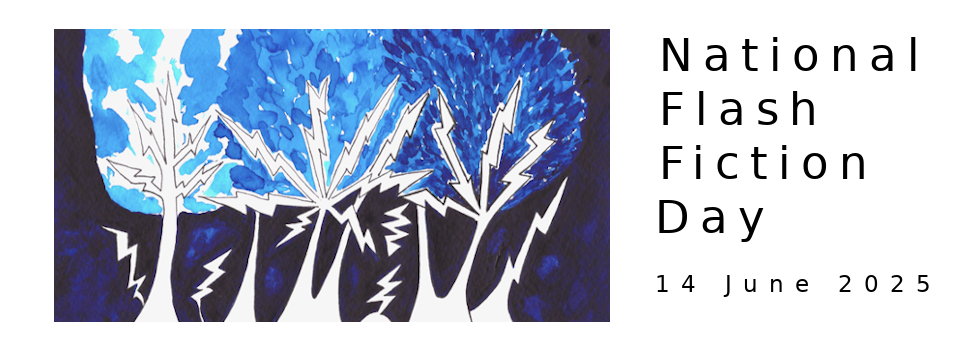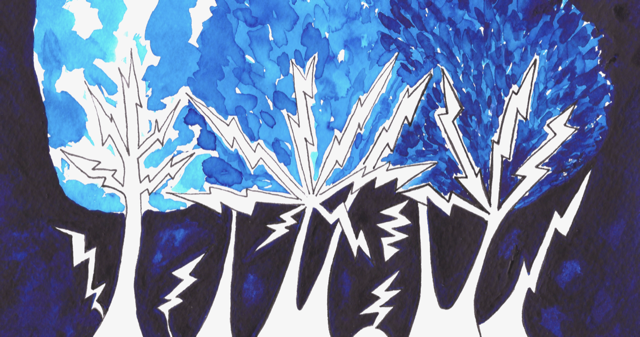Welcome to the second in our series of interviews with this year's National Flash Fiction Day Anthology editors and Microfiction Competition judges! This week, Diane Simmons chats with Rachael Dunlop, one of this year's judges for the 2021 NFFD Microfiction Competition, about writing, resilience, social media, and what she'd love to see amongst the competition entries....
Diane: You have been an enthusiastic supporter of NFFD from the outset and are a judge in this year’s Microfiction Competition. Having been in a number of NFFD anthologies yourself, can you give any advice for people submitting to the micro fiction competition.
Rachael: I always hesitate to give writing advice, because even though I’ve been writing flash fiction for over a decade, every time I start a new story, it’s like the first time, and I’ve no idea if I can produce the goods. When I’m struggling to get a story started, I will often use a specific and vivid memory as the seed and see where it takes me. These are often my most successful stories. Even in micro fiction I try to include sensory information, and the way to do this with such a limited word count is to make your vocabulary do double-duty: find words that are both specific and evocative. Mood and voice can also carry a lot of the narrative weight so try playing with that. And don’t forget to give your story a narrative arc: even in micro fiction, it’s important to get the sense that something has changed over the course of the piece. Or not changed, but there was struggle for change. Most of all, be ambitious — the best microfiction can encompass worlds.
Diane: You have a strong twitter presence. Do you think that it’s important for writers to engage with social media?
Rachael: I don’t think writers should feel any pressure to engage with social media if they don’t want to. It’s a myth that literary agents and publishers look more favourably on writers with large social media platforms and the days are long gone when a personal blog would be picked up for publication with a huge advance. Rather than using Twitter primarily as a tool to promote myself and my writing, I use it as a resource to connect with other writers and with writing organisations. I’ve made many real friends in the flash writing community through both Twitter and Facebook, people who are supportive, generous, funny and brilliant. On a practical level, Twitter especially is a great place to find out about competitions, flash fiction journals and writing courses. Connecting with other writers on social media has also really helped me to understand how the writing world works, which is really important in negotiating the highs and lows of acceptances and rejections.
Diane: What book is currently on your bedside table?
Rachael: I’ve just started reading Small Pleasures by Clare Chambers, which has been a big word-of-mouth hit in 2020. It’s set in 1957 in South East London and the period detail and atmosphere is superb. I’m already invested in the characters, just a few chapters in and it promises to be my favourite sort of fiction, which takes the particular and makes it universal.
Diane: Many people would say to be a writer you need to be sensitive, but that it is also necessary to be resilient – to be able to accept rejection and move on. Is resilience something you have had to work at?
Rachael: Absolutely. I’ve built up my resilience over time and in layers, like a lacquer shell. The sensitivity I need to be a writer is still there, under the armour. There have been two things that have made me more resilient as a writer: not shying away from exposing myself to failure; and understanding that both acceptances and rejections are subjective, and neither can be taken as a definitive judgement of your worth as a writer. I know many writers struggle not to see rejections as proof that they can’t write – so many of us start from a place of self-doubt rather than faith in our skills and talent. But it’s not just a platitude to say that rejection only means that particular story wasn’t right for that editor, or that competition, at this specific time. And yet so many stories get binned after one rejection, stories that might go on to be accepted somewhere else without so much as a comma being changed.
Successful writers are the ones that persist, who edit and resubmit stories they believe in until they land on the right desk. Successful writers have MORE rejections, not fewer, because they keep putting their work out there. I’ve had stories doing the rounds for years (yes, years) before being accepted. If I had given up on each story on its first rejection, my list of publications and competition listings would be tiny.
Ultimately, it’s a numbers game: the more you submit, the more you risk rejection, but the more chance you have of finding a home for your work, which in turn makes the rejections sting less. The two things go hand-in-hand.
Diane: I know that as well as writing flash, you have written several novels. Do you think that being a flash writer influences your novel writing?
Rachael: For me, flash and novel writing are very different disciplines, and I find it hard to switch between them. If I’m novel writing, I’ll write very little flash fiction and vice versa, so my first instinct was to say they don’t influence each other. But thinking about it, I can see that writing flash has given me several tools that have aided and improved my novel writing. For example, if I get stuck with a scene in a novel, I will often rewrite it as if it were a piece of flash fiction instead, and let the freedom that gives me lead the writing. Doing just this sort of exercise helped me find the distinctive narrative voice in my first novel. Writing flash has also taught me to let go of things that aren’t working, and trust that the second, third or further version of something will be The One, but that I have to work my way through the versions that don’t work to get to the ones that too. It’s easier, psychologically, to do this with pieces of work that are very short, but it’s an important part of novel writing too. Finally, while I’ve always been a concise writer, writing flash has definitely sharpened my prose further. Unnecessary words are always unnecessary, whether the word count is 100 words or 100,000.
 Rachael Dunlop grew up in Belfast and now lives in London. She started writing flash fiction in 2009 when she won the NYC Midnight Flash Fiction Challenge. And thus an addiction to short-short fiction was born. Since then, her short and flash fiction has been published in anthologies from National Flash Fiction Day, Bath Flash Award, Bath Short Story Award, The Scottish Arts Club, Retreat West, and Stories for Homes. She has also been widely published online, including at FlashBack Fiction, Lunate Fiction, Flash Flood Journal, and Words with Jam. Her name regularly appears on various competition long and short lists, and occasionally she even wins things. Her flash fiction has been nominated for both the Pushcart Prize and Best Small Fictions. She alternates writing short fiction with efforts to produce a publishable novel. Her two attempts so far have both been longlisted for the Bath Novel Award and remain works in progress.
Rachael Dunlop grew up in Belfast and now lives in London. She started writing flash fiction in 2009 when she won the NYC Midnight Flash Fiction Challenge. And thus an addiction to short-short fiction was born. Since then, her short and flash fiction has been published in anthologies from National Flash Fiction Day, Bath Flash Award, Bath Short Story Award, The Scottish Arts Club, Retreat West, and Stories for Homes. She has also been widely published online, including at FlashBack Fiction, Lunate Fiction, Flash Flood Journal, and Words with Jam. Her name regularly appears on various competition long and short lists, and occasionally she even wins things. Her flash fiction has been nominated for both the Pushcart Prize and Best Small Fictions. She alternates writing short fiction with efforts to produce a publishable novel. Her two attempts so far have both been longlisted for the Bath Novel Award and remain works in progress.
SUBMISSIONS ARE NOW OPEN for this year's National Flash Fiction Day Anthology and Micro Fiction Competition. Submissions close on 15th February 2021. For more information, please visit our Anthology and Competition guidelines.


 rinzi is a Co-Director of National Flash Fiction Day in the UK and one of the founding organisers of the annual Flash Fiction Festival. His debut, full-length flash fiction collection, This Alone Could Save Us (2020), is available from Ad Hoc Fiction. His flash fiction collection, There’s Something Macrocosmic About All of This (2018), is available from V. Press. His writing has been published in various magazines and anthologies, including Best Small Fictions 2019, Best Microfiction 2020, SmokeLong Quarterly, Flash: The International Short-Short Story Magazine, Jellyfish Review, and many more. To find out more follow him on Twitter (@tinoprinzi) or visit his website:
rinzi is a Co-Director of National Flash Fiction Day in the UK and one of the founding organisers of the annual Flash Fiction Festival. His debut, full-length flash fiction collection, This Alone Could Save Us (2020), is available from Ad Hoc Fiction. His flash fiction collection, There’s Something Macrocosmic About All of This (2018), is available from V. Press. His writing has been published in various magazines and anthologies, including Best Small Fictions 2019, Best Microfiction 2020, SmokeLong Quarterly, Flash: The International Short-Short Story Magazine, Jellyfish Review, and many more. To find out more follow him on Twitter (@tinoprinzi) or visit his website:  Jeanette Sheppard’s collection Seventy Percent Water won the 2020 Ellipsis Zine Flash Fiction Collection Competition. Her flash fiction appears in numerous literary magazines and anthologies, including the Bath Flash Fiction Anthology, Reflex Fiction, Mslexia and four National Flash Fiction Day anthologies. One of her flash fictions pops out of a vending machine in Canada. She is currently redrafting her novella-in-flash that was Highly Commended by Ellipsis Zine in their 2019 competition.
Jeanette Sheppard’s collection Seventy Percent Water won the 2020 Ellipsis Zine Flash Fiction Collection Competition. Her flash fiction appears in numerous literary magazines and anthologies, including the Bath Flash Fiction Anthology, Reflex Fiction, Mslexia and four National Flash Fiction Day anthologies. One of her flash fictions pops out of a vending machine in Canada. She is currently redrafting her novella-in-flash that was Highly Commended by Ellipsis Zine in their 2019 competition. Nik Perring is a short story writer and the author of five books. His work has appeared in many fine places all over the world including Smokelong, Word Riot, 3 :AM Magazine, and The Fiction Desk. His re-telling Little Red Riding Hood, Carmine’s Fruit, won the Artificum Short Story Prize. It’s also been read on the radio, performed on the stage, printed on fliers and appeared, with Dave Eggars’, on a High School Distance Learning course in the US.
Nik Perring is a short story writer and the author of five books. His work has appeared in many fine places all over the world including Smokelong, Word Riot, 3 :AM Magazine, and The Fiction Desk. His re-telling Little Red Riding Hood, Carmine’s Fruit, won the Artificum Short Story Prize. It’s also been read on the radio, performed on the stage, printed on fliers and appeared, with Dave Eggars’, on a High School Distance Learning course in the US.